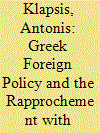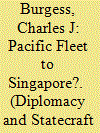|
|
|
Sort Order |
|
|
|
Items / Page
|
|
|
|
|
|
|
| Srl | Item |
| 1 |
ID:
193154


|
|
|
|
|
| Summary/Abstract |
This essay examines in detail the early years of British planning for a post-war security policy. The first years of the war saw British statesmen and officials consumed by concerns over the military conflict and hesitant to commit the government to specific war aims. This tendency changed by 1940 and 1941, due largely to fears that a failure to counter German propaganda about a ‘new order’ for Europe would lead European populations to accept Nazi designs for future economic and political order on the continent. Though there was an active, if amorphous, debate taking place within Britain about the future international order and Britain’s place within, there remained a lack of concrete policy development. The Atlantic Charter, while a profound moment in hindsight, was not exactly viewed as such by British officials at that time. The true strategic re-direction came in the summer of 1942, when the Foreign Office produced its ‘Four Power Plan’. Though the subject of heated debate in the autumn of 1942, the policy recommendation was eventually accepted in principle by the British Cabinet and would go on to define Britain's grand strategy for the remainder of the war.
|
|
|
|
|
|
|
|
|
|
|
|
|
|
|
|
| 2 |
ID:
193151


|
|
|
|
|
| Summary/Abstract |
Diplomatic equality, the equality that exists between states in their diplomatic interactions, is one important feature of contemporary diplomacy. The objective of this article is to show how and why diplomatic equality developed over the last centuries. This exploration begins in early modern Europe, then turns to the nineteenth century to illustrate changes and continuities, and then moves on to Japan to illustrate how regional European practices became globalised. Finally, it discusses how diplomatic equality became dominant in the twentieth century and then suggests some major reasons for this transformation in diplomatic practices.
|
|
|
|
|
|
|
|
|
|
|
|
|
|
|
|
| 3 |
ID:
193156


|
|
|
|
|
| Summary/Abstract |
Going beyond the external functions of a diplomat this article places itself within the New Diplomatic History field and engages with an intricate aspect of the diplomatic self, that of duty. By telling the story of Christos Xanthopoulos-Palamas, one of the most prominent Greek diplomats, it examines how diplomatic duty is rationalised and imported in the realm of politics under authoritarian rule. Based on memoires, archival material, published diaries and the press of the time, this study follows Xanthopoulos-Palamas’ career and examines how the experienced diplomat justified his cooperation with the regime of the colonels despite his distaste for their antidemocratic practices. The belief in a concept of duty to the nation that surpasses the ephemeral existence of political structures and thus compelling him to strive to keep the ‘national aircraft’ afloat is at the core of his rationalisation behind his decision to get involved in domestic politics during the dictatorship.
|
|
|
|
|
|
|
|
|
|
|
|
|
|
|
|
| 4 |
ID:
193158


|
|
|
|
|
| Summary/Abstract |
This article uses a qualitative historical analysis to scrutinise previously underutilised documents housed in the Ministerio de Relaciones Exteriores de Cuba (MINREX) archive in Havana to examine Cuban-Soviet relations during 1991, the final tumultuous year of close Havana-Moscow relations. Specific focus will be given to the MINREX reaction to the August 1991 coup in Moscow and its aftermath. This article will offer several new findings. Principally that throughout 1991 MINREX officials firstly attempted to affect the bilateral relationship by both lobbying Soviet officials while in Cuba, and they proposed utilising glasnost for their own purposes. This proposal was despite a conceptual aversion to the Soviet process. Secondly, MINREX officials endeavoured to lobby Russian officials, including trying to facilitate a meeting with Andrei Kozyrev the Russian Foreign Minister. These endeavours were notwithstanding the adverse reporting of Boris Yeltsin, the Russian President, and his actions during 1991 in both the MINREX documents and Cuban state media.
|
|
|
|
|
|
|
|
|
|
|
|
|
|
|
|
| 5 |
ID:
193153


|
|
|
|
|
| Summary/Abstract |
The year 1930 was a turning point for Greek-Turkish relations. It was the year that the two neighbouring countries set the foundations for their close diplomatic cooperation that lasted throughout the 1930s. This paper seeks to explain the reasons why Greece decided to pursue such a policy. It is argued that Athens was eager to form a pro-status quo front with Ankara in order to deter the revisionist tendencies of powers in the Balkans and the Eastern Mediterranean (namely Bulgaria and Italy). This was a strategic choice on the part of Greece which explains why it was followed by all the Greek governments (irrespectively of their ideological and/or partisan association) from 1930 until the outbreak of the Second World War.
|
|
|
|
|
|
|
|
|
|
|
|
|
|
|
|
| 6 |
ID:
193155


|
|
|
|
|
| Summary/Abstract |
For the 20 years before the outbreak of the Pacific War, Great Britain based its grand strategy in the Far East around the presence – and potential – of the Singapore Naval Base. The Americans, for a time, agreed in the project’s potential in the face of increasing Japanese belligerence. This analysis examines the place of the Singapore Naval Base in Anglo-American planning for the defence of Southeast Asia. It focuses on British efforts to lobby the Americans to deploy the Pacific Fleet to Singapore to deter Japan, the evolution of American plans for the defence of the Far East, and how all these interacted. It argues that the British desire to use the Pacific Fleet as a deterrent force based at Singapore, and the American assessments of how the Pacific Fleet would actually fight Japan from Singapore, represented a conceptual disconnect they could not overcome until faced with imminent hostilities. Scrutinizing the discussions and plans related to this understudied episode provides additional understanding not only how the aspirant allies viewed the growing threat from Japan, but also how they viewed each other.
|
|
|
|
|
|
|
|
|
|
|
|
|
|
|
|
| 7 |
ID:
193152


|
|
|
|
|
| Summary/Abstract |
Scholars have rarely acknowledged that international oil companies first entered the Middle East to sell oil rather than to seek sources of it. The arrival of American kerosene in 1864 began this understudied preamble to the region’s oil history, with Standard Oil dominating the Ottoman market until the 1880s. Russian oil then flooded the market and pushed Standard Oil out by the 1890s, though Standard had regained a foothold before World War I. This article draws two major conclusions from this market battle. First, the competition for the Ottoman market demonstrates that it was the contest for oil markets, more than the fight for oil sources, that led to the global oil industry’s cartelisation in the early twentieth century. Second, this study shows how an American multinational pressured the United States government to expand its regional presence, thus helping to elucidate the deepening of American engagement with the Middle East.
|
|
|
|
|
|
|
|
|
|
|
|
|
|
|
|
| 8 |
ID:
193157


|
|
|
|
|
| Summary/Abstract |
The ability of Non-Governmental Organisations (NGOs) to modify the status quo generates heated discussions in academia. The literature on this partnership identifies many potential loopholes which the former are enabled to fill in, a situation known as retreat of state. NGOs are influential actors in pursuing public diplomacy through non-ordinary and semi-formal ways assisting to forge genuine partnership with foreign public opinions, specifically in underdeveloped countries, to achieve the goals of their parent state. Turkish civil society actors, in this regard, promote Turkey’s image and mould its identity in an exemplary fashion in order to broaden the scope of Turkish soft power in tandem with state institutions. The NGO’s competences in reaching to isolated areas, engaging with local communities through aid and voluntary-based membership free from financial burden, work hand-in-hand with the state which forms an important part of the capacity to foster and facilitate a better image of Turkey. This research undertakes an analysis of NGO-led foreign aid activities, within the framework of the public diplomacy context, that lead in a spectrum of situations by using participatory methods. In particular, it scrutinises how Turkish NGOs’ aid activities portray Turkey’s public diplomacy, putting the country in good light. Effective Turkish humanitarian campaigns are used as a case study to further develop an understanding of Turkey’s public diplomacy initiatives.
|
|
|
|
|
|
|
|
|
|
|
|
|
|
|
|
|
|
|
|
|